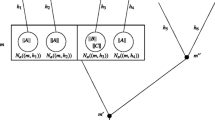Abstract
In a recent paper Berto introduces a semantic system for a logic of imagination, intended as positive conceivability, and aboutness of imaginative acts. This system crucially adopts elements of both the semantics of conditionals and the semantics of analytical implications in order to account for the central logical traits of the notion of truth in an act of imagination based on an explicit input. The main problem left unsolved is to put forward a complete set of axioms for the proposed system. In the present paper I offer a solution to this problem by providing a complete axiomatization of a generalization of the original semantics. The difficulty in proving completeness lies in the fact that the modalities that capture the notion of truth in an act of imagination are neither standard nor minimal, so that the construction of the canonical model and the proof of the truth lemma are to be substantially modified.
Similar content being viewed by others
References
Berto, F., Impossible Worlds and the Logic of Imagination, Erkenntnis 82:1277–1297, 2017.
Berto, F., Aboutness in imagination. Philosophical Studies first online: 1–16, 2017.
Blackburn, P., M. de Rijke, and Y. Venema, Modal logic, Cambridge University Press, 2001.
Chalmers, D., Does conceivability entail possibility?, in T. Gendler, and J. Hawthorne, (eds.), Conceivability and Possibility, Oxford University Press, 2002, pp. 145–199.
Chalmers, D., The Nature of Epistemic Space, in A. Egan, and B. Weatherson, (eds.), Epistemic Modality, Oxford University Press, 2011, pp. 60–107.
Chellas, B., Basic conditional logic, Journal of Philosophical Logic 4:133–153, 1975.
Chellas, B., Modal Logic. An Introduction, Cambridge University Press, 1980.
Fine, K., Analytic implication, Notre Dame Journal of Formal Logic 27:169–179, 1986.
Fine, K., A theory of truthmaker content I: conjunction, disjunction and negation, Journal of Philosophical Logic 46:625–674, 2017.
Lewis, D., Counterfactuals, Blackwell, 1973.
Olkhovikov, G. K., and H. Wansing, An axiomatic system and a tableau calculus for stit imagination logic, Journal of Philosophical Logic first online, 1–21, 2017.
Urquhart, A., A semantical theory of analytical implication, Journal of Philosophical Logic 2:212–219, 1973.
Wansing, H., Remarks on the logic of imagination. A step towards understanding doxastic control through imagination, Synthese 194:2843–2861, 2015.
Yablo, S., Aboutness, Princeton University Press, 2014.
Acknowledgements
I would like to thank Franz Berto, Ilaria Canavotto, Peter Hawke, Aybüke Özgün, and two anonymous referees of this Journal for stimulating discussions and helpful comments.
Author information
Authors and Affiliations
Corresponding author
Additional information
Presented by Heinrich Wansing
Rights and permissions
About this article
Cite this article
Giordani, A. Axiomatizing the Logic of Imagination. Stud Logica 107, 639–657 (2019). https://doi.org/10.1007/s11225-018-9810-z
Received:
Published:
Issue Date:
DOI: https://doi.org/10.1007/s11225-018-9810-z




